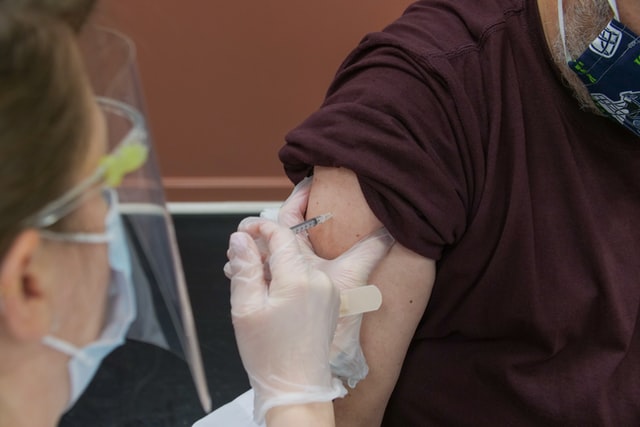Getting vaccinated is the key to surviving and ending the COVID-19 pandemic. Although the vaccine is not 100% effective in preventing the illness, it can still reduce the spread of infection.
The COVID-19 vaccine equips us with protective antibodies, paving the way for herd immunity. But what if some people don’t want to get the vaccine? Due to frustration, many can’t help but discriminate against the unvaccinated.
Even some doctors refuse to treat unvaccinated patients because of dwindling medical resources and the psychological impact the pandemic has on health care professionals. The question is, is this ethical?
In this blog, let’s dive into the subject of providing medical treatment for those who have elected to not be vaccinated against COVID-19.
My Opinion on the COVID-19 Vaccines
Before we get into anything else, I want to be upfront — I am a strong advocate of vaccines and getting vaccinated against COVID-19. It does a fantastic job of protecting people from severe illness, death, and hospitalization. It’s essential for high-risk individuals and people in the approved age group, including seniors and children, to get vaccinated.
Everyone eligible must get the jab, both the primary series and the booster. However, we know that a certain percentage of the population will not get it.

Should the Unvaccinated Receive Healthcare?
People refuse to get the COVID-19 vaccine for various reasons. Should there be any repercussions to their choice? Reading about this topic online, different doctors and health professionals seem to have different views.
There are several articles about doctors who refuse to treat patients unless they’re vaccinated. Moreover, there are talks of hospitals with ICUs potentially turning away unvaccinated people to save the beds for other patients.
Some arguments look into the concept of potentially restricting medical care to the unvaccinated, as reflected in an NBC News article. There are also articles, like this piece from the Wall Street Journal, that inferred that ethically, it’s not the right thing to do.
Refusing Healthcare is a Slippery Slope
In an unfree society, it’s fine to mandate people to take certain precautions. However, in a free society like ours, mandating things, especially when it comes to healthcare, is very tough.
If someone chooses not to wear a motorcycle helmet, and they get into a crash, should we take care of them? Accidents happen. Of course, we should. What if someone decides to smoke and ends up getting emphysema? Should they get the medical help they need? Yes, definitely.
From time to time, we encounter overweight people who develop heart problems. Many cannot commit to a healthy diet. Furthermore, people engage in all kinds of risky behavior that lead to emergency health issues. Even sexually transmitted diseases are often a result of risky behavior. Whether it’s an accident or a result of troubling actions, it’s not their fault that they got sick.
Should we triage people based on how they got their medical condition, or just treat their health issues without any questions?
Refusing Healthcare to Manage Resources
COVID-19 cases worldwide are on a decline. But we’re still in a pandemic, dealing with breakthrough infections and scarce medical resources. Should we allocate those resources only to the vaccinated? That is a very tough decision to make.
It’s a slippery slope. We could just go down the line and make hard decisions about people’s poor choices. But no one in the medical field should become a judge on what got someone into that particular situation.
A patient was denied a kidney transplant because he refused to get the COVID-19 vaccine. Some would argue that kidneys are a rare commodity. Thus, we don’t want to take a chance with someone who doesn’t want to get vaccinated.
Who else are we going to turn away in the future?
As physicians who have taken an oath to take care of people, we should give them the medical help they need and provide them with the right information. We are not here to second guess their past decisions, only to help them make good future decisions.

I encourage almost everyone I meet to get the vaccine, whether it’s in a professional environment or not. Let’s encourage people to make the right decisions by providing them with the details necessary to make those decisions. Withholding care is not the right way to go. It’s not fair to be angry and upset at those who refused to get the vaccine.
Refusing Healthcare to Protect Healthcare Workers
Is it ethical to refuse unvaccinated people medical help, so we can protect our healthcare workers? Protecting medical staff by refusing care for the unvaccinated is a bad precedent. Even before the pandemic, several patients with different contagious diseases came to hospitals.
There was a time when people were afraid of HIV patients before we knew how it was transmitted. We’ve always taken special precautions with gowns and masks.
Today, most medical staff are required to be vaccinated against COVID-19. They also take extra precautions when an unvaccinated patient comes in — like when dealing with other infectious diseases, they wear masks and commit to all the necessary protocols for maximum protection.
Choosing not to expose health care workers to COVID-19, despite all the precautions, is a bad precedent that will soon lead to other problems in the future.
Final Thoughts on Refusing Healthcare to the Unvaccinated
This situation appears to be unique to the COVID-19 pandemic, as it’s the first time that we have heard of career physicians being judgmental and even thinking about not giving care to certain types of patients. It’s possible that wanting to potentially punish unvaccinated people represents something partisan, not medical.
In the end, we shouldn’t judge our patients. Rather, we ought to be compassionate and caring, even if someone has not made great medical decisions.













